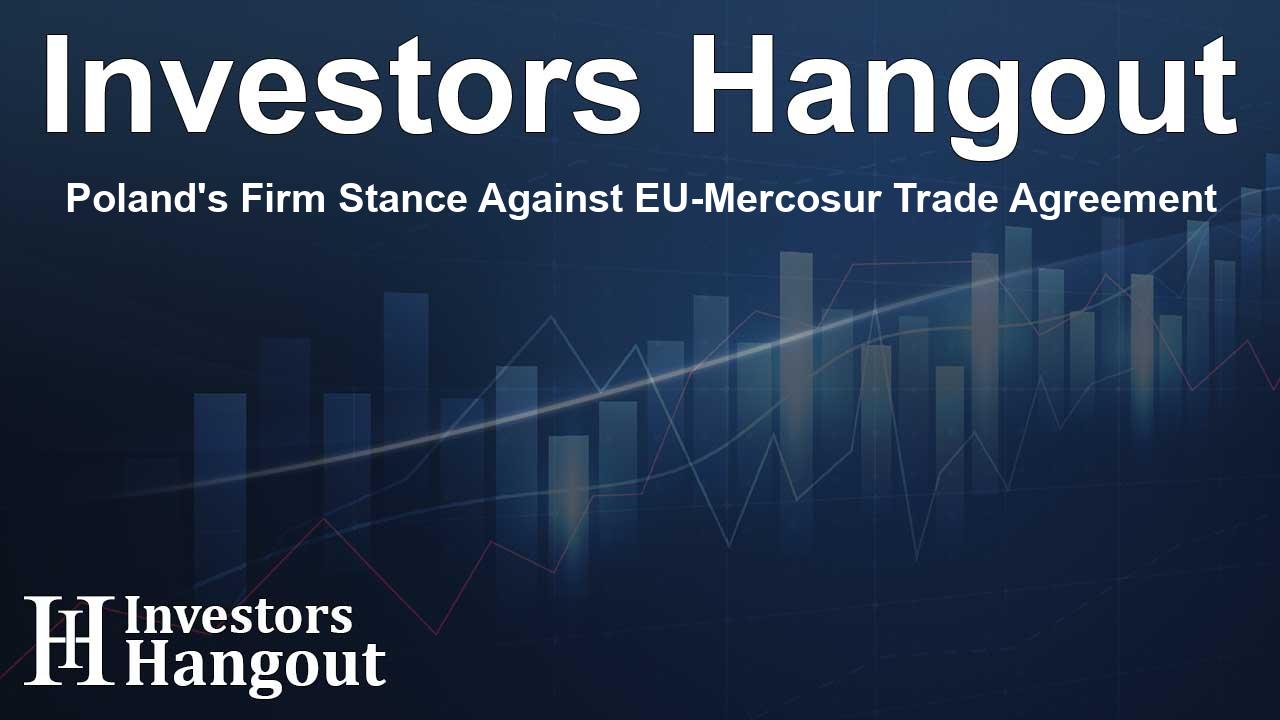Poland's Firm Stance Against EU-Mercosur Trade Agreement

Poland's Opposition to the EU-Mercosur Trade Deal
Poland has made headlines with its strong opposition to the EU-Mercosur free trade agreement with South American nations. The current form of the deal, according to Prime Minister Donald Tusk, does not adequately support Polish farmers and poses a risk of unfair competition.
Understanding the EU-Mercosur Agreement
This agreement aims to create a trade partnership between the European Union and the Mercosur bloc, which comprises countries like Brazil, Argentina, Bolivia, Paraguay, and Uruguay. While supporters, including Germany, argue that the deal would unleash new market opportunities for exports, dissenting voices, particularly from farmers, warn of the potential repercussions.
The Risks for European Farmers
Farmers in Poland and across the EU have raised concerns that the agreement would result in an influx of agricultural products from South America, which are not subject to the same rigorous regulatory standards as those in the EU. This could disrupt the local agricultural markets, leading to unfair competition and financial challenges for local producers.
Recent Protests Highlighting Farmers' Concerns
In response to these mounting concerns, Polish farmers recently staged a protest at the Medyka border crossing with Ukraine, emphasizing their discontent with the trade deal. This rally followed significant demonstrations not just in Poland but also in France and Brussels, signaling widespread disagreement among EU agricultural communities.
The Position of Other EU Nations
In line with Poland's position, French President Emmanuel Macron has also expressed his opposition to the agreement, highlighting a united front among some EU nations against the proposed trade deal. France, known for its robust agricultural sector, is lobbying to gather support from other EU members to establish a minority bloc opposing the agreement as it is currently structured.
The Stakes Involved in the Trade Deal
The EU-Mercosur deal, if ratified, would permit the import of significant quantities of agricultural products. Analysis suggests an allowance for 99,000 tons of beef, 190,000 tons of sugar, and 180,000 tons of poultry meat, among other commodities. This influx of goods has raised alarms for EU farmers who believe that the competitive landscape will significantly shift in favor of imported goods.
Conclusion: The Future of the EU-Mercosur Agreement
As discussions continue and the deadline for signing approaches, the future of the EU-Mercosur agreement remains uncertain. Poland, alongside France and other nations, is likely to continue voicing its dissatisfaction until a revised deal is presented that prioritizes the interests of European farmers and maintains the rigorous standards currently in place. The path ahead will require careful negotiation to ensure that any agreement reached is equitable and takes into account the concerns of all stakeholders involved.
Frequently Asked Questions
What is the EU-Mercosur trade deal?
The EU-Mercosur trade deal is an agreement aimed at establishing a trade relationship between the European Union and the Mercosur countries, promoting trade by reducing tariffs and other barriers.
Why is Poland opposed to the EU-Mercosur trade deal?
Poland is opposed to the deal as it believes it would expose EU farmers to unfair competition from South American products that do not meet the same regulatory standards.
Are there protests happening in response to the deal?
Yes, Polish farmers have protested against the deal, blocking border crossings and rallying against the potential negative impacts on their livelihoods.
What are the key concerns of farmers regarding the agreement?
Farmers are concerned that the agreement will lead to an influx of imported products that can undermine local production due to differing regulations and standards.
What might the future hold for the EU-Mercosur agreement?
The future remains uncertain; negotiations will continue, and there may be significant changes required to address the concerns of dissenting EU nations before any agreement can be finalized.
About Investors Hangout
Investors Hangout is a leading online stock forum for financial discussion and learning, offering a wide range of free tools and resources. It draws in traders of all levels, who exchange market knowledge, investigate trading tactics, and keep an eye on industry developments in real time. Featuring financial articles, stock message boards, quotes, charts, company profiles, and live news updates. Through cooperative learning and a wealth of informational resources, it helps users from novices creating their first portfolios to experts honing their techniques. Join Investors Hangout today: https://investorshangout.com/
Disclaimer: The content of this article is solely for general informational purposes only; it does not represent legal, financial, or investment advice. Investors Hangout does not offer financial advice; the author is not a licensed financial advisor. Consult a qualified advisor before making any financial or investment decisions based on this article. The author's interpretation of publicly available data shapes the opinions presented here; as a result, they should not be taken as advice to purchase, sell, or hold any securities mentioned or any other investments. The author does not guarantee the accuracy, completeness, or timeliness of any material, providing it "as is." Information and market conditions may change; past performance is not indicative of future outcomes. If any of the material offered here is inaccurate, please contact us for corrections.